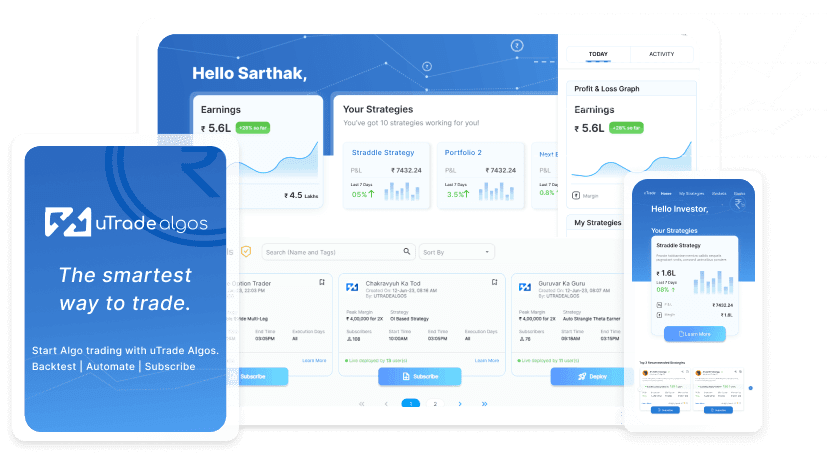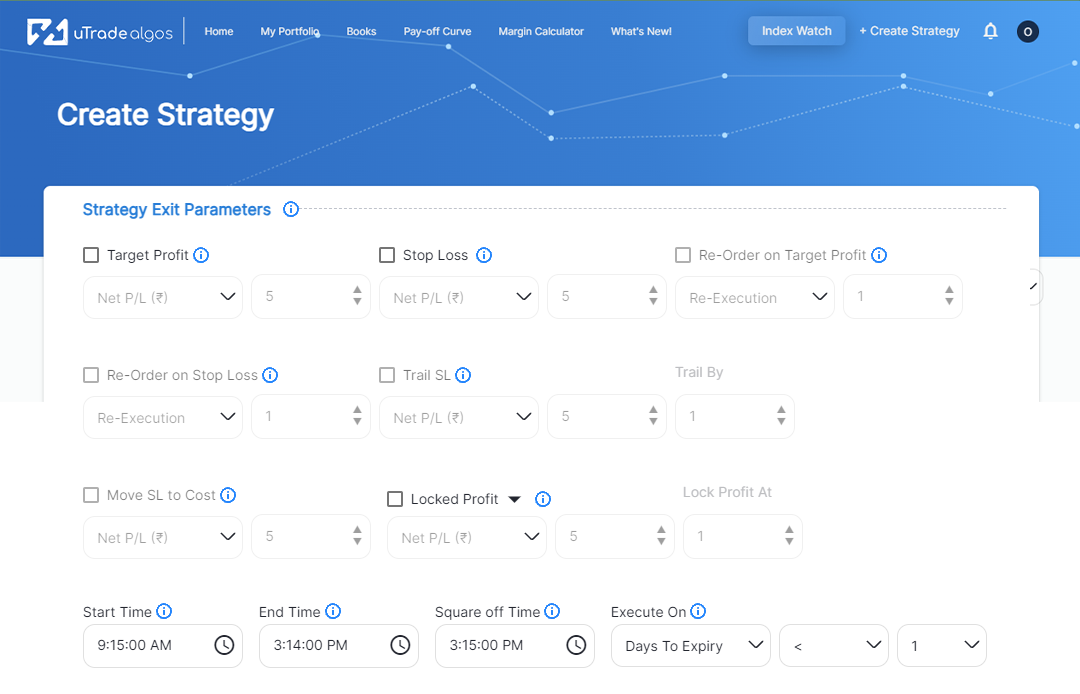
Options Greeks play a pivotal role in understanding and evaluating the risk and behaviour of options within algorithmic trading on platforms like uTrade Algos. These indicators, including Delta, Gamma, Theta, Vega, and Rho, are essential metrics for traders employing algorithmic strategies. However, misinterpreting or misusing these Greeks can lead to costly errors. Let’s understand the top five mistakes to avoid when analysing options Greeks within algorithms.
Defining Options Greeks
Options Greeks are a set of mathematical measurements used to quantify the various factors influencing an option’s price and its sensitivity to changes in market conditions. These metrics provide traders with valuable insights into the risk associated with options positions. There are several key Greeks:
- Delta measures the rate of change of an option’s price concerning changes in the underlying asset’s price
- Gamma evaluates the rate of change in Delta
- Theta assesses the impact of time decay on an option’s value
- Vega quantifies an option’s sensitivity to changes in implied volatility
- Rho indicates an option’s sensitivity to changes in interest rates.
Each Greek, within an algo trading platform, offers unique information crucial for understanding the behaviour of options in response to shifts in underlying assets, time, volatility, and interest rates, assisting traders in making informed decisions and managing risks effectively.
Importance of Options Greeks
Options Greeks provide crucial quantitative measures that assess risk, and price sensitivity, and inform strategic decision-making in options trading, be that algo trading in India or otherwise.
- Risk Assessment: These provide quantitative measures that help traders assess and quantify the risk associated with options positions.
- Price Sensitivity Analysis: They offer insights into how an option’s price will respond to changes in factors such as underlying asset price, time decay, volatility, and interest rates.
- Hedging Strategies: Greeks aid in constructing hedging strategies by understanding and managing the risk exposure of options portfolios.
- Portfolio Optimisation: They assist in optimising options portfolios by adjusting positions based on changes in Greeks, aiming for desired risk-reward profiles.
- Decision-making Tools: Options Greeks serve as decision-making tools, helping traders determine entry and exit points for positions based on changes in market conditions and risk tolerance levels.
Mistakes to Avoid When Analysing Options Greeks
Neglecting Dynamic Changes
- Options Greeks are not static; they change in response to fluctuations in underlying asset prices, time, volatility, and interest rates.
- Algorithms, on trading platforms like uTrade Algos, must be designed to dynamically update and account for these changes.
- Failure to do so can result in inaccurate risk assessments and flawed trading decisions. Implementing real-time data feeds and robust algorithms in algorithmic trading can continuously recalculate Greeks can help address this issue.
Overlooking Inter-Greek Relationships
- Each Options Greek is interconnected and influences others.
- For example, Delta and Gamma are interrelated. Changes in Delta impact Gamma, altering the option’s sensitivity to price movements.
- Ignoring these relationships can lead to an incomplete understanding of risk and could result in unexpected outcomes.
- Algorithmic models should consider these interdependencies to create a comprehensive risk assessment.
Misinterpreting Vega’s Impact on Volatility
- Vega measures an option’s sensitivity to changes in implied volatility. It indicates the potential risk posed by volatility fluctuations.
- However, traders might misinterpret Vega’s influence on options. They could underestimate the impact of sudden volatility spikes or overreact to smaller fluctuations.
- Incorporating a nuanced understanding of Vega into algorithms is crucial for accurate risk evaluation.
Underestimating Time Decay (Theta)
- Theta measures an option’s rate of decay as time progresses. Traders might underestimate Theta’s significance, disregarding the impact of time on option values.
- Neglecting Theta can result in holding positions longer than advisable, leading to increased losses due to time erosion.
- Algorithms should consider Theta in determining optimal entry and exit points for positions.
Ignoring Rho’s Influence
- Rho measures an option’s sensitivity to changes in interest rates. While Rho generally has a smaller impact compared to other Greeks, it shouldn’t be disregarded.
- Traders might overlook Rho’s influence, assuming interest rate changes have negligible effects on option pricing. However, during economic shifts or specific market conditions, Rho can significantly affect option valuations.
- Incorporating Rho into algorithmic models ensures a more comprehensive risk assessment.
Tips to Avoid Mistakes
- Sophisticated Algorithms: Algorithms within algo platforms must swiftly adapt to ever-changing options Greeks, ensuring real-time adjustments for precise risk assessment and decision-making.
- Consider Interrelationships: Understanding the intricate connections among Delta, Gamma, Theta, Vega, and Rho empowers traders to comprehend the collective impact of these Greeks on options behaviour, refining risk management strategies accordingly.
- Accurate Interpretation: Precisely grasping Vega’s response to implied volatility, Theta’s influence due to time decay, and Rho’s sensitivity to interest rates aids in crafting more informed algorithmic models for options trading.
- Continuous Refinement: Constantly refining algorithms allows for adaptability to varying market dynamics, enabling traders to promptly recalibrate strategies based on underlying asset movements, volatility shifts, and interest rate fluctuations.
- Optimise Strategies: Utilising updated algorithms enhances decision-making precision, enabling traders to optimise options trading strategies within algo platforms for better risk mitigation and improved outcomes.
Ultimately, a holistic understanding of Options Greeks and their dynamic nature, in automated algo trading, coupled with sophisticated algorithmic models, can significantly enhance the accuracy and effectiveness of options trading strategies.

 January 8, 2024
January 8, 2024 







